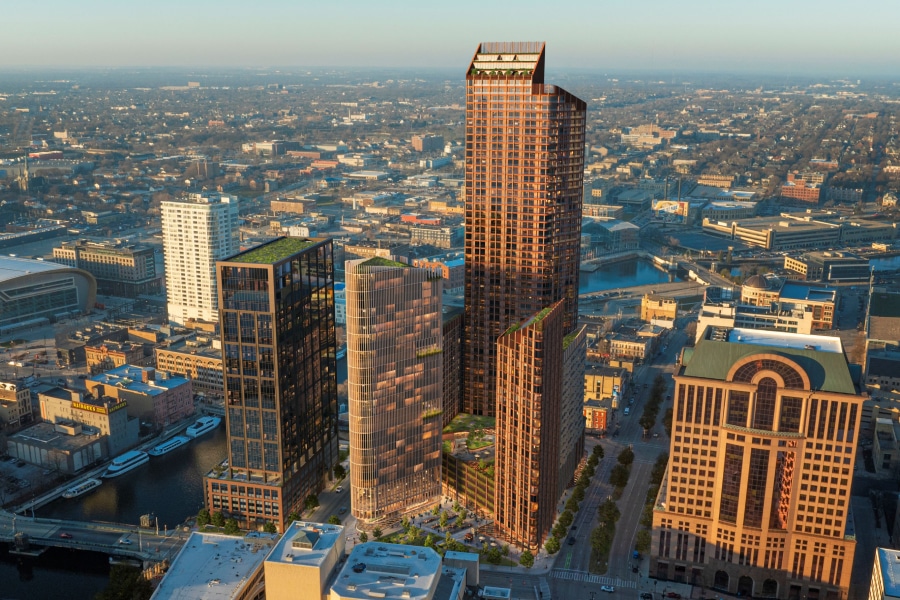Why the green credentials of construction companies matter
Open the pages of any publication or read any website that covers the construction industry and you’ll find companies boasting massive sustainability credentials.
Given the environmental impact that can result from delivering and operating buildings, it makes perfect sense for a construction firm to highlight the fact that it’s putting up structures sustainably.
After all, the building’s occupants want to know it has the least possible effect on the world around it, and along with claims from developers to this effect, sustainability accreditation programs have been created to illustrate a building’s green credentials.
But the claims of businesses across a variety of sectors are coming under scrutiny, with some accused of ‘greenwashing’, where an environmental claim falls short of the reality.
How can construction companies avoid making declarations about the sustainability of their projects that ultimately don’t stack up?
What is corporate greenwashing?
The term ‘greenwashing’ was first coined in the mid-1980s by environmentalist Jay Westerveld, who took issue with the oft-used practice of hotels urging their guests to ‘save a towel’ to help the environment, while wasting resources elsewhere.
According to the Competition and Markets Authority’s co-ordinated global review of around 500 randomly selected websites, around 40% of green claims made online could be misleading consumers.
Perhaps the most infamous case of corporate greenwashing was Volkswagen’s fraudulent claims about its diesel cars emitting fewer emissions than ultimately proved to be the case.
To greenwash, therefore, is to create the impression among customers – existing and potential – that a business is carrying out environmentally friendly activities, when such claims are simply a form of window dressing.
Greenwashing in construction is part of the problem
Large swathes of the construction sector have outlined their commitment to protecting the environment to the best of their ability, but concerns remain around how sustainable and future-proof certain new buildings are.
That said, the World Building Council has 175 signatories to its Net Zero Carbon Buildings Commitment, which sets out the industry’s ambitions around reducing its impact on the environment.
The commitment requires that by 2030, ‘existing buildings reduce their energy consumption and eliminate emissions from energy and refrigerants removing fossil fuel use as fast as practicable, where applicable. Where necessary, compensate for residual emissions.’
It adds: ‘New developments and major renovations are built to be highly efficient, powered by renewables, with a maximum reduction in embodied carbon and compensation of all residual upfront emissions.’
And while the UK government recently rolled back some of its commitments to achieve net zero by 2030, the built environment has been keen to stress that veering off course is not an option.
But does that mean construction doesn’t engage in greenwashing? Unfortunately, no. While some projects and building materials make debatable claims that they are sustainable, some industry watchers suggest that greenwashing is the result of environmental legislation.
Clients, do your homework
For those seeking environmental standard bearers, due diligence is vital. As Elaine Butler of the Circular Design Institute spells out: ‘If asked, most companies will say that sustainability is important, but often this doesn’t translate into action, particularly when it comes to assigning the necessary resources.
They’ll have very good reasons why nothing has progressed since the last meeting, and those reasons are largely genuine, but the proof is in the pudding. You don’t get the results if you don’t do the work.’
Butler suggests that clients look for positive signs from a company – its sustainability track record, the resources it funnels toward sustainability – and at a project level, evidence of the impact of its sustainability credentials, how the sustainability elements have been implemented and how the firm progresses its new products and services.
When it comes to avoiding going down the road of greenwashing in construction, what do firms need to consider?
How to avoid greenwashing in future projects
Be honest and clear
First of all, be true to your goals and ambitions when it comes to running of your business and projects from an environmental perspective. Spell them out in clear, unequivocal terms and back them up with facts. Keep accreditation claims simple; bombarding people with claims about who’s recognised your sustainability efforts can lead to confusion.
If you’re genuinely focused on delivering sustainable schemes, the investment and people in place across your business to help bring such projects about need to be visible.
Don’t make sustainability claims about your business or a project you are developing that do not stand up to scrutiny. Avoid using marketing language that exaggerates the situation or, worse, makes up environmental benefits that don’t exist.
The consequences of corporate greenwashing can be considerable. Volkswagen was fined nearly US$4.5 billion (AU$7 billion) for its emissions deception, with its reputation and integrity trashed.
While the scale of the German carmaker’s deceit was unprecedented, its punishment should serve as a warning to others trying to hoodwink customers and the authorities.
Customer satisfaction
So, is greenwashing in construction a threat to sustainability ambitions? Potentially. Like any business, saying things that aren’t true will damage customer confidence, sometimes irreparably. Worse, society won’t get the built environment it deserves.
The Harvard Business Review (HBR) carried out a study of 202 publicly traded large U.S. firms, looking at those companies’ stated goals and actions relating to green product innovation from 2008 to 2016, along with customer satisfaction data from the American Customer Satisfaction Index (ACSI).
The research found that companies that were believed to be greenwashing suffered an average 1.34% drop in their ACSI customer satisfaction score, and, HBR said, ‘since companies are intensely competing within a relatively narrow range of ACSI scores, a 1.34% drop matters.’
‘This blow to customer satisfaction is economically significant; prior studies found that even small changes in a firm’s customer satisfaction score can have significant implications for corporate performance.’
So focus on your sustainability goals, realise them and deliver or commission projects that stand the test of both scrutiny and time.











